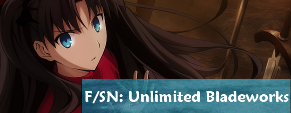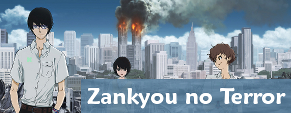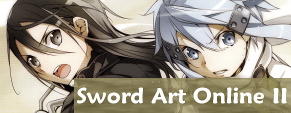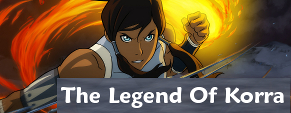Review-Roundup: God Eater 01, Aquarion Logos 02, Nagato Yuki-chan no Shoushitsu 12-15
 This is where the anti-hero needlessly tries to convince himself (and us) that beneath this angsty and angry façade isn’t a heart of gold.
This is where the anti-hero needlessly tries to convince himself (and us) that beneath this angsty and angry façade isn’t a heart of gold.
This time I review:
God Eater 01: Another mopy teenager in another post-apocalyptic world that can’t get its shit together! Luckily said angsty teenager will save them all… at his own pace naturally.
Aquarion Logos 02: Do words even matter? What do we have to tell each other that a bunch of mechas or weirdly characterized cleaning-ladies can’t convey without a lot of words? Look at it that way: You need one word to pilot a mecha but how many words does it take to order a coffee at Starbucks…?! Really makes you think, doesn’t it?
Nagato Yuki-Chan no Shoushitsu 12-15: Turns out alien-Nagato is cooler than the moe-Nagato this spin-off invented. Big surprise! But this isn’t her story…! Where would the romantic drama come from if the female lead were an actual cool person…?!
God Eater 01 Review:
 Guess it’s time to turn God Eater into an Airbud-spinoff.
Guess it’s time to turn God Eater into an Airbud-spinoff.
How well does silence work in an animated series? Anime-TV-series usually neither have the budget nor the time to add so much subtlety to a character’s movements that non-verbal communication becomes a big thing in a scene. And while that doesn’t mean that an Anime-TV-series is unable to let silence speak for itself in a specific moment, Anime-series are better off trying to fill that silence with comments from the characters instead of trying to communicate whatever subtext the scene has through the silence. It’s easier to let the voice-actor or –actress convey the subtleties of a character’s emotional state than to let the animation- and art-department figure out how they can convey that without anything getting said. This is important to note because a lot of this first episode depends on silence.
Of course, you wouldn’t expect that as God Eater is actually the anime-adaptation of a somewhat successful gaming-franchise. And not only is that franchise celebrating an anniversary but in October there will be a new God-Eater-game coming out (which will feature most of the characters you’ve seen in the first episode here). So, it’s already clear that one of the objectives is here to get more people to buy this game (which frankly looks like something from the PS3 era and seems to play like a Monster-Hunter-style game with a few gimmicks if the trailer for the new game is to be believed).
At least as first impressions go, the series doesn’t shove that down your throat like some other adaptations do. Despite the obvious links to its source-material, this first episode does a lot to establish its own identity. You never get the sense that this is one of those lazy adaptations that never thought about the medium-transition happening with such an adaptation. A lot of gamey elements are buried in rather well developed exposition here and the battles (while clearly inspired by the game) have some individualistic personality.
ufotable is animating this series and what has made F/SN:UBW’s scenes so great is also apparent here. Where F/SN evoked the supernatural strength and speed of the Servants with its fluid, sudden movements, here you get a nice contrast of heavy movements and those bursts of energy (as whatever special energy is used that exists in this series’ setting). When the main-character swings his sword you can actually see the weight of that thing by how slow his attacks are.
Two things, though, kept me from actually getting invested in this first episode. The first is the direction. Takayuki Hirao is directing this series and he mostly worked on scripts for certain episodes except the one time when he directed the fifth movie of the Kara no Kyoukai series (that’s how he’s connected to ufotable). Now, a lot of the fifth movie’s somber tone is also in this first episode but where it seemed appropriate in that Kara no Kyoukai movie with its mystical atmosphere, here it kinda falls flat because of how neither the setting nor the characters warrant this much introspection at this point. You can actually set the clock to this in this episode as 80% of the time whenever someone says something there will be a beat before the other characters replies. At some point it just becomes jarring how no one can just give a natural answer but always has to consider what the other person is thinking or what that character himself is thinking secretly. There’s a lot of silence in this first episode that tries to evoke emotional tension but since the episode is pulling the same move here non-stop it just becomes tiring at some point. At some point it started to feel like the silence existed for the benefit of the story the series wanted to tell instead of the audience. It’s the sort of stand-off-ish attitude that pushes the audience away saying “Guess what, punk, we aren’t gonna tell you shit now! Just accept that you can’t relate to whatever is going on now!”.
It doesn’t get much better with what the episode is actually sharing with the audience. A lot of it is of the “been there, done that”-sort: You got the grim-dark atmosphere, the grisly, bloody deaths, the VERY talented protagonist with revenge-quest and some oddball as his sidekick who’s all too ready to play second fiddle to the main-guy. There are also a bunch of veterans who are cool and super-powerful but who have to bow to the main-guy’s super-talent. Nothing about this first episode made me think “Oh, I gotta see how this turns out!”.
None of the themes present in this first episode seem particularly original or intriguing. And when you pair that with that unnecessarily mysterious direction, you naturally get an episode that feels as grey-ish as it looks. I would like to say that this would at least mean that the first episode nailed the tone of the series but the first episode’s relationship with its ideas is so passive that you’re relieved when the main-chara disobeys the commander and goes outside to kill monsters. But even then the series tries to be a downer without earning that kind of drama. In an attempt to offer a more grim perspective on the events, the first episode ended up downplaying the main-chara’s actions to a point where it seemed incidental instead of inspirational. When the main-chara managed to turn his sword into a gun, all I could think was “Well, good thing, he was there…”.
On the surface you would think this series would be all about the exhilaration of heroic people doing heroic shit in a very stylish way but this first episode made it look dourer than I’d like. There’s a lot of “pregnant silence” without any real meaningfulness in this episode and the rest is just the usual grimdark shtick, it seems.
Episode-Rating: 6.0/10
Aquarion Logos 02 Review:
![[HorribleSubs] Aquarion Logos - 02 [480p].mkv - 00000](https://otakuness.wordpress.com/wp-content/uploads/2015/07/horriblesubs-aquarion-logos-02-480p-mkv-00000-e1436822432109.png?w=604) Haha, it’s funny because she goes all ‘tsun tsun’ in response to the proposal of getting eaten by her captors while she’s being very shy about the whole thing at the same time (since she’s actually a tsundere)… *sigh* To think that someone actually considered this to be an actual punchline…
Haha, it’s funny because she goes all ‘tsun tsun’ in response to the proposal of getting eaten by her captors while she’s being very shy about the whole thing at the same time (since she’s actually a tsundere)… *sigh* To think that someone actually considered this to be an actual punchline…
In a way there’s nothing more predictable than a high-concept-series failing to connect with the audience and you’d think such a series would take steps to avoid that – but that’s exactly what’s happening here. Where Aquarion Evol had a very by-the-numbers-story that only entertained because of how energetic and overbearing its presentation had been, you now got a series that really only works on the abstract level of its concepts and ideas. Any discussion about the importance of words and how good or bad they are for humanity are the most interesting thing happening right now in this series – but it’s abstract stuff you look for in philosophic literature and not a series about mechas beating up shitty monsters.
To understand what is even going on in this series you have to understand this series’ pseudo-supernatural stance towards words and what they do to humans. It isn’t anything deep or something that references a specific philosophy but rather the sort of fictional concept that borrows from a lot of different sources. One, words are magical. Language has always played a big role in what we would call magic. Religions like Christianity or Hinduism for example treat language that way (just watch The Exorcist and see how important words from the bible are in a exorcism-ritual and Hinduism has all those cycles whose earliest is all about language actually being capable of doing magic while said ability got lost over the next centuries). The second idea is that words are firmly assigned to one or multiple things. Of course, that’s a rather simplistic perspective on how naming stuff works. The series tries to explain it away by claiming that the only true alphabet of the universe are kanji (which is, well… not a very open-minded perspective, of course). But this way you don’t get into any conflicts over what is named what as seemingly it’s only relevant what the present state of one language is. One can only hope that future episodes will explore the complexity of language as an idea (especially in the context of our globally connected present).
The third important point is what the villains and heroes are fighting for. But you can already see the series struggling to simplify things in that regard. The villain corrupts words to wreck destruction while the heroes just defeat these words (which have turned into monsters in some special dimension). Of course, any intelligent viewer will quickly realize that any battles the series has shown so far haven’t been about any physical concerns (despite how often the series tries to tell the audience otherwise) but about the abstract relationship humanity has with language. The evil guys want to erase language because if words like war, rape or murder would cease to exist humans wouldn’t even have an idea that this was an option for them. But of course, that would make things too subtle, so the bad guys don’t just corrupt bad words but whatever word seems appropriate (this episode indicates that Sougan, that stupid cult-leader, is getting his ideas from some weird book for what word he corrupts next).
Ironically the hero-character seems closest to what the evil guys want to achieve. This dude who continually calls himself the savior seems like a noble-savage-stereotype in how single-minded he is and how he isn’t interested in any internal politics governing the good guys’ organization or that the captured girl is supposed to be on his enemy’s side. The main-character isn’t exactly a sociopath but seemingly being a hero is ALL he cares about. There’s nothing personal about who he wants to save or what he does to save humanity. It all feels like the work of an ignorant person who simply doesn’t know what else to do. But the same way the villain talks about erasing language, the hero serves as a good example of someone who probably doesn’t have an extensive vocabulary (because he doesn’t need that due to his simplistic but noble ideals).
Right now it’s hard to see what the selling-point of this series is supposed to be. Despite all its abstract high-concept storytelling the series doesn’t seem deep so far but all its characters do little to develop a personality beyond some superficial elements. As an introduction, it’s hard to see where the “hook” is supposed to be. What makes this series special is so abstract and high-concept that the series would have to dig very deep to arouse the interest of an audience who would give a shit about this sort of thing in the first place.
Episode-Rating: 5.5/10
Nagato Yuki-Chan no Shoushitsu 12-15 Review:
![[C12] The Disappearance of Nagato Yuki-chan - 13.mp4 - 00001](https://otakuness.wordpress.com/wp-content/uploads/2015/07/c12-the-disappearance-of-nagato-yuki-chan-13-mp4-00001-e1436823067263.png?w=604) JP Hogan wrote this hokey Sci-Fi-novel in 1977. He wrote it in response to seeing Kubrick’s 2001: A Space Odyssey while having loved most of the movie hated the ending. While this first novel was well-received, later installments of the so-called Giants-series were less so. The connection to a Japanese series…? From 2011 to 2012 Yukinobu Hoshino released a manga-adaptation of this novel which won the Seiun Award of comics.
JP Hogan wrote this hokey Sci-Fi-novel in 1977. He wrote it in response to seeing Kubrick’s 2001: A Space Odyssey while having loved most of the movie hated the ending. While this first novel was well-received, later installments of the so-called Giants-series were less so. The connection to a Japanese series…? From 2011 to 2012 Yukinobu Hoshino released a manga-adaptation of this novel which won the Seiun Award of comics.
This series’ plothook is very curious. After all, as far as first impressions go it’s easier to think of this series as a stand-alone experience that is only loosely related to the original Haruhi-Suzumiya-series. And a lot of the first half of this series has been devoted to re-establishing the premise of the Disappearance-Of-Suzumiya-Haruhi in a manner that isn’t driven by Kyon trying to escape that world but by how he falls in love with Nagato. Add to that the fact that the Nagato of this series is radically different from the Nagato presented in the original series and you either lose interest in this series because of this standalone-mentality or you simply convince yourself to not try to understand how the internal plot-logic of the original premise justifies this version. What you’ve gotten for sticking around, though, is a rather bland love-story with comedy that more or less just repeats the same old superficial jokes based on the roles said characters play.
It’s actually when the series takes its romance-premise serious that it produces its best scenes. While it’s hard not to notice the cheesiness and naivety prevalent in these scenes, they actually work because it’s only in these scenes where the series challenges its characters. Often the romance is accompanied by awkwardness and nervousness which isn’t the most intriguing foil for a romance the audience is supposed to cheer for but the series does at least a decent job of presenting that stuff.
Naturally the series tried to raise the stakes for the mid-season-finale with the original alien-Nagato coming back and replacing the moe-Nagato. And until the 11th episode the series goes the expected route of that Nagato failing to relate to Kyon and everyone else while the latter are in despair over the disappearance of the moe-Nagato. With the 12th episode, though, the series tells its story mostly from Nagato’s perspective and it’s here where the series finally finds a unique voice for its romance.
The biggest story-decision is here to not think of moe-Nagato as a mask the alien-Nagato had used to better get along with the people she liked but instead the series presents those two as two different people (so something more like twins than a person with a multiple-personalities-disorder). But it goes even further as the alien-Nagato remembers what moe-Nagato has experienced and alien-Nagato actually has an existential crisis regarding her blossoming feelings for Kyon. And for once the romance has an edge to it that the series has never managed to have before. Because moe-Nagato is still there and alien-Nagato quickly realizes that at some point she will have to disappear again – which adds a tragic as well as urgent tone to her romantic pursuits. Cheering for alien-Nagato is far easier than just cheering for just another shy girl who takes her sweet time to confess to the one she loves (and who actually already kinda loves her).
The drama in this mid-season-finale is certainly some of the best moments in this show so far and the way it ends is bittersweet as well. For a moment it even seems like the series is right on track as it immediately asks the question after alien-Nagato’s disappearance: “But what if Kyon actually liked alien-Nagato better than moe-Nagato?” It’s disappointing that the series doesn’t commit to this and instead Kyon quickly refocuses his attention on moe-Nagato. And to fill the void of alien-Nagato, the series also revives the love-triangle-stuff with Haruhi getting serious again about romantically pursuing Kyon.
And after that the series once again commits itself to doing trivial comedy. At least, the mid-season-finale jumpstarted some serious romantic developments between Nagato and Kyon – but one can only wonder how much more interesting this series could be if alien-Nagato had stayed around or if the series had started to ask the hard questions regarding Kyon and alien-Nagato. As things stand, the series only continues to hint at deeper questions while actually pursuing more straightforward ones.
Episodes-Rating: 12th-14th: 7.0/10 15th: 6.0/10
Posted on July 13, 2015, in Anime, Aquarion Logos, God Eater, Reviews and tagged Anime, Aquarion Logos, アクエリオンロゴス, ゴッドイーター, 長門有希ちゃんの消失, God Eater, Nagato Yuki-chan no Shōshitsu, review, The Disappearance of Nagato Yuki-chan. Bookmark the permalink. Leave a comment.


















Leave a comment
Comments 0